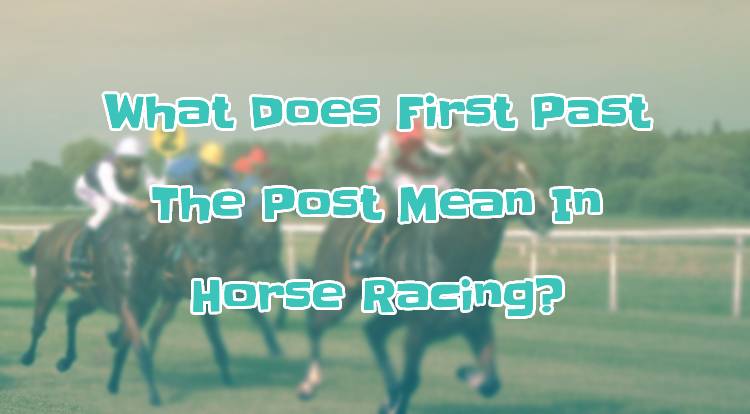
Ever wondered what "first past the post" means in the world of horse racing? In simple terms, it's all about which horse crosses the finish line first. This might sound straightforward, but there's a bit more to it.
Picture a group of horses sprinting towards the end of the track. The thrill, the cheers, and then, one glorious horse edges ahead. That winner, the first to get its nose over the line, is what we call "first past the post".
But why does this matter? Apart from winning bets, it's a key part of understanding races and who comes out on top. Stay tuned as we dive deeper into this concept and its importance in horse racing.
First Past The Post Meaning In Horse Racing?
In the buzzing world of horse racing, "first past the post" is a term every fan quickly gets to know. But what exactly does it mean?
The phrase refers to the very moment a horse crosses the finish line before any other competitor. It's the climax of the race, the point at which a clear winner is determined. This doesn't just mean a moment of fame for the winning horse and jockey. It's crucial for bettors, as bets are often placed on which horse will claim this victorious moment.
In a nutshell, "first past the post" is the heartbeat of horse racing. It's the moment that not only decides winners but also settles bets.
Example Of First Past The Post
Let's bring "first past the post" to life with a straightforward example.
Imagine a horse race with four runners: Lightning Strike, Thunder Rush, Wind Whisperer, and Shadow Glide. They're off, galloping furiously around the track.
As they near the finish line, the crowd's excitement builds. It's a close race, but suddenly, Lightning Strike pushes ahead, nose stretching forward, muscles straining. And there it is - Lightning Strike crosses the finish line by a mere fraction before the others. This horse has won the race by being the "first past the post".
This victory also determines the outcome of bets on the winner of the race. Any bets placed on Lightning Strike to win are the ones that receive winnings.
First past the post isn't about who was leading during the race; it's all about who crosses that finish line first. It brings a clear and definitive end to the intense anticipation of the race.
When Is First Past The Post Not Applied?
While "first past the post" is a key rule in horse racing, there are a few situations where the first horse across the line might not end up being the winner. Let's shed some light on these exceptions.
Distorted Start
If the race starts off incorrectly, say, a gate doesn't open properly, or a horse is unfairly disadvantaged right from the get-go, officials might declare it a false start. In such cases, the outcome might be reconsidered, affecting the usual "first past the post" rule.
Objections and Inquiries
After the race, jockeys or race officials can raise concerns or objections about the race's conduct. Perhaps there was interference, or a rule was broken. When this happens, the stewards will review the race. If they find the objection valid, it can change the initial result, even if the horse was the first past the post.
Disqualification Drama
The most impactful exception is a disqualification. If a horse that finished first violated race rules, it can be disqualified. This means the horse can lose its winning title despite being the first past the post.
In these scenarios, the victory and any bets might shift to the next horse in line, demonstrating that while speed is vital, fairness and following the rules are just as crucial in horse racing.
Do Bookies Pay On First Past The Post?
So, after learning that there are instances where first past the post may not apply, you may be wondering: Do bookies pay out on first past the post? Let's dive into how things work.
Clear-Cut Victory
In the happiest and simplest of outcomes, when a horse wins a race without any disputes, bookies usually pay out bets on that horse promptly. This is the straightforward case of "first past the post", where everything is clear and undisputed.
Pending Inquiries
However, horse racing can have its moments of drama. Sometimes, there are objections or inquiries after the race, questioning the fairness of the result. During such times, some bookies might hold off on paying out until the inquiry is resolved. If the first past the post result stands, bets placed on that horse are paid out, but if it changes, then the bookies may award winnings based on the official results rather than first past the post.
Disqualifications and Revisions
Things get more complicated with disqualifications. If the horse that finished first is disqualified after an inquiry, most bookies still honour bets on it as a part of the first past the post rule. Additionally, they also pay out on the horse that is officially declared the winner after the disqualification. This means, in some cases, payouts might be made on two horses for the same race.
Understanding these scenarios helps bettors know what to expect in various situations, ensuring fewer surprises in the thrilling world of horse racing betting. However, it's important to note that different bookies may have different policies for such situations. Therefore, it's crucial to read through the rules and policies of the specific bookmaker you place bets with to know what to expect in such an event.
